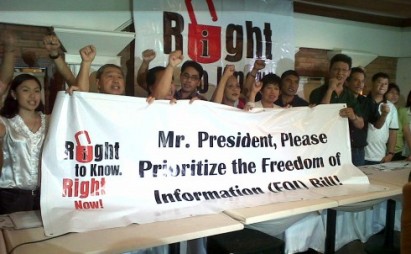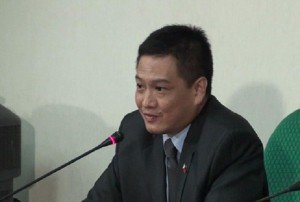WHAT’S UP with the Freedom of Information bill?
It’s in a touch-go situation still in the House of Representatives.
Whether it will fly or die in the 15th Congress will be known in the next four weeks, or in the next nine session days of the House from January 21 to February 6, 2013.
Want to help save and push the FOI bill into law? Read on
Final push for the passage of the FOI Bill: Update on Status
By Atty. Nepomuceno Malaluan
Co-Convenor, Right to Know. Right Now! Coalition and
Co-Director, Institute for Freedom of Information
A. Legislative Status of the FOI Bill
• The Senate has already passed the FOI bill on Second Reading (11 Dec 2012) and Third Reading (17 December). Thus it only awaits the passage of the counterpart measure from the House of Representatives, before a bicameral conference can be convened to harmonize any disagreeing provisions between the Senate and House versions.
• At the House of Representatives, a committee report has been submitted to the House plenary for action. The next step will be for the formal sponsorship of the committee report by the Committee Chairman (Rep. Ben Evardone) and co-sponsorship by interested authors. After sponsorship, the measure will undergo a period of interpellation and then a period of amendments, before it is put to a vote on Second Reading. If the bill is favorably voted on Second Reading, it will again be put to a vote on Third (final) Reading, after a minimum 3 days after copy of the bill passed on Second Reading has been distributed to members. A certification by the President to the necessity of its immediate enactment dispenses of the minimum 3 days of copy circulation.
• Only nine session days remain when Congress resumes session on January 21. After this it will adjourn for elections, and resume for only 3 days in June for the closing ceremonies of the term of the 15th Congress.
B. Malacañang Version was Adopted in Full by Senate and House Committee
• In early 2011, the President organized a Study Group on the FOI bill led by Undersecretary Manolo Quezon, with DBM Secretary Florencio Abad also taking an active role in the Study Group’s work. The Study Group intended to address concerns raised by the President and executive agencies, revolving around the adequacy of protection of national security matters and the President’s executive privilege. They also addressed concerns by sections of the bureaucracy over the gravity of the penal provisions.
• In January 2012, Secretary Manolo Quezon III announced that the President has approved the Malacañang Version embodying their proposed amendments. In early February Secretary Abad transmitted the Malacañang Version to Congress.
• The amendments proposed by Malacañang have been adopted fully in the bill passed by the Senate, as well as in the Committee Report approved by the House Committee and now awaiting plenary action. The key Malacañang amendments include:
a. Expansion of the national security exception by inserting the words “national security” in exception (a). The working version of Congress confined the national security exception to defense and foreign affairs. Inserting the words “national security” gives the Chief Executive greater flexibility in the determination of what information may be kept secret by reason of national security concerns.
b. Introduction of a new exception relating to the President’s presidential communications privilege (or what is more popularly know as “executive privilege”).
c. To address the concerns of the bureaucracy over the gravity of the penal provisions, most of the offenses have been reclassified as administrative offenses. Also, Malacañang introduced a section making good faith on the part of public officials a defense for unlawful denial of information.
d. Malacañang also introduced a number of changes on the list of documents for mandatory publication (posting in websites), including the SALNs of top government officials. They also introduced a number of amendments on the record-keeping standards and publication requirements of laws.
e. The Study Group agreed to a number of balancing amendments proposed by advocates to address possible government abuse of the exceptions. In addition to the reiteration of the jurisprudence that the burden of proving an exception lies with government, it added the following qualifications: the exceptions are to be strictly construed; the exceptions cannot be used to cover-up a crime, wrongdoing, graft, or corruption; the President, the Supreme Court, the Senate, the House of Representatives, and the Constitutional Commissions may waive an exception when they deem that there is an overriding public interest in disclosure. (The Senate also added a judicial public interest override consistent with existing jurisprudence.)
• Any other changes made by the Senate and the House Committee were non-controversial, and respected and kept intact all amendments proposed by Malacañang.
C. Challenges to Passing the Measure in the House of Representatives
• What we though would have been a smooth legislative process after Malacañang’s endorsement of its version (legislative work was suspended for a time to await the result of the work of the President’s Study Group) did not materialize, however. A major obstacle was the lack of cooperation from the House committee chairman, who postponed a number of committee hearings resulting in delays. Also, the non-mention of FOI in the President’s third SONA was regarded by the Committee Chairman as a signal that the bill is not really among the President’s priorities.
• Still, the bill still has a fighting chance of getting passed in the current Congress, given that the Senate version has been approved and there remains time, however short, for the House to take action in the remaining nine session days.
• Even without the President’s certification, the House Committee on Rules, through the Majority Leader, is empowered to declare a bill urgent, and to set the number of days or hours to be allotted for the consideration of the bill in plenary, and when vote on the bill shall be taken. Rule X (Bills, Resolutions, Messages, Memorials and Petitions), Section 52, reads:
“Urgent Bills and Resolutions. – The Committee on Rules, through the Majority Leader, may declare a bill or resolution urgent and consider it in accordance with a timetable. The timetable, prepared by the Committee on Rules, shall fix the date when the bill or resolution must be reported by the committee concerned, the number of days or hours to be allotted to the consideration of the bill or resolution in plenary session, and the date and hour debate must be concluded and final vote taken.”
• Concededly, however, there are a number of obstacles that need to be addressed: the problem with quorum as election nears; the remaining lack of political commitment on the part of the House leadership to pass the measure (which translates also to an uncooperative Committee chairman who is tacked to defend the bill in plenary); the existence of a House faction resisting the bill on the argument that it will be prone to abuse by media and citizens (the “right of reply” proponents).
• In relation to the right of reply issue, one of its vocal proponents (Rep. Rodolfo Antonino), insists on making a provision on right of reply a rider to the FOI bill. Under his proposed provision, whenever there is material published in any media based on information obtained under FOI, any person mentioned in the publication is given the right to have a reply published in equivalent space, under pain of fines and even closure for refusal to do so.
• The advocates have opposed this right of reply rider to the FOI bill as patently unconstitutional, infringing on the freedom of speech and of the press. It intrudes into the editorial prerogatives over clearly protected speech/expression. The advocates appeal instead that the right of reply be tackled in a separate measure (there are separate right of reply bills in both Senate and House) to allow for full-blown discussion among stakeholders without holding hostage the passage of the FOI bill.
• In addition, the Senate version has adopted a provision already addressing the fears of citizen/media abuse of FOI, which is supported by advocates. The authors of the bill in the House intend to adopt a similar provision. Section 20 of the FOI bill approved by the Senate reads:
“SEC. 20. No Abuse in the Exercise of Rights and in the Performance of Duties Under this Act. – Public officials and employees, in the performance of their duties under this Act, as well as citizens in the exercise of their rights under this Act, shall act with justice, give everyone his or her due, and observe honesty and good faith.
Public officials and employees as well as citizens shall endeavor to handle information kept or obtained under this Act with due care, to the end that inaccuracies and distortions are avoided.
Any public official or employee, or citizen who, in the performance of duties or exercise of rights under this Act, willfully or negligently causes loss, damage or injury to another, in a manner that is contrary to law, morals, good customs or public policy, shall compensate the latter for the damage incurred. This is without prejudice to other remedies available to the aggrieved party under any other law for the same acts.
• All things considered, advocates believe that the insistence on a right of reply rider is really a monkey wrench to passing the FOI bill by politicians who are really opposed to the FOI bill per se.
D. Final Push for the Bill in the 15th Congress
• The FOI champions in the House are determined to make a final and determined push for the passage of the FOI bill in the House in the remaining nine days. But they need visible support from all sectors, directed at convincing the House leadership, and the President as well, to make the passage of the FOI bill a priority when session resumes on January 21.
• We call on friends and allies of the campaign, and those who support the passage of the bill, to monitor the events on FOI in the coming 4 weeks. We ask for support for campaign initiatives, such as through media coverage, attending House sessions, and directly asking members of the House for their support.
• We encourage everyone to speak on FOI in all platforms (print, broadcast, online and social media). Be heard on FOI!



